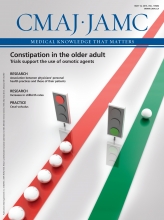The authors of a review of evidence on the cardiovascular harm from a popular smoking-cessation drug have been awarded for their contribution to health care research in Canada.
CMAJ presented the Bruce Squires Award to Dr. Sonal Singh and coauthors for their article “Risk of serious adverse cardiovascular events associated with varenicline: a systematic review and meta-analysis” (CMAJ 2011;183:1359–66). It was chosen from all of the papers published in the journal during 2011.
The paper examines the evidence around cardiovascular events such as heart attacks, arrhythmias, heart failure and death from cardiac arrest among people using varenicline (marketed as Chantix or Champix), a nicotine-replacement tablet.
Singh is an assistant professor of medicine and international health at Johns Hopkins School of Medicine and Public Health in Baltimore, Maryland. He coauthored the paper with Dr. Yoon Loke, the co-convenor of the Cochrane Adverse Effects Methods Group, Dr. John Spangler, professor of family and community medicine at Wake Forest University Baptist Medical Center in Winston-Salem, North Carolina, and Dr. Curt Furberg, professor of public health sciences, who also works at Wake Forest.

Dr. Sonal Singh and coauthors received the award for their article on the cardiovascular risks associated with varenicline.
Image courtesy of Dr. Sonal Singh
The award honours the late Bruce Squires, who worked at CMAJ from 1984–1996, including seven years as the journal’s editor-in-chief.
Squires promoted high standards of reporting and evidence-based medicine, which makes this paper a fitting choice, says CMAJ Editor-in-Chief Dr. John Fletcher.
“This is one of the few systematic reviews that has been published on the harmful effects of a drug,” says Fletcher. “I think it has made a significant contribution to the medical literature.”
Singh says the research has affected policy and “probably affected prescribing.”
“We are now monitoring patients who are on [varenicline],” says Singh.
The United States Food and Drug Administration added cardiovascular risk warning labels on varenicline in anticipation of the paper’s findings, says Singh.
The systematic review analyzed data from 14 double-blind randomized control trials with a total of 8216 participants. There were adverse cardiovascular events in 1.06% of the varenicline group compared to 0.82% in the placebo group.
“My team is probably the world’s leading team in doing meta-analysis of drug safety; we’ve done many of them and we’re actually setting standards on how to do them,” he says.











